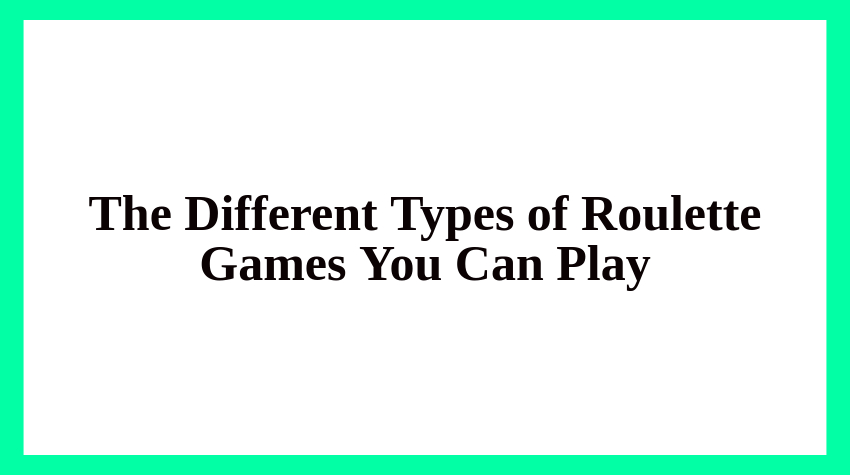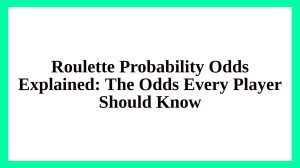Roulette is one of the most popular and exciting games in both online and land-based casinos. The game’s simplicity, combined with the thrill of spinning the wheel, has captivated players for centuries. While the core of the game remains the same across different versions, there are several variations of roulette that offer unique twists on the classic formula.
In this guide, we’ll walk you through the three most common types of roulette games: European Roulette, American Roulette, and French Roulette. We’ll explore their differences, explain how each version works, and provide insights into how to choose the best one for your playstyle. Whether you’re new to roulette or a seasoned player, understanding the nuances of each type can enhance your gaming experience.
European Roulette: The Classic Version
How European Roulette Works
European Roulette is widely regarded as the most straightforward and most popular version of the game. It’s played with a single zero wheel, which consists of 37 pockets in total. These pockets are numbered from 0 to 36, alternating between red and black, with the 0 being green.
- The Wheel: The wheel contains 37 pockets: 18 red, 18 black, and one green pocket (the 0).
- The Table Layout: The table layout for European Roulette mirrors the wheel. It has sections for different betting options, including individual numbers, columns, and groups of numbers.
Key Features of European Roulette
- Single Zero: European Roulette has one zero, which reduces the house edge to about 2.7%, making it the best option for players in terms of odds.
- Lower House Edge: Because of the single zero, European Roulette offers better odds compared to American Roulette.
- Betting Options: Players can place inside and outside bets, similar to other versions of the game. The most common inside bets include betting on specific numbers, splits, streets, and corners, while outside bets include betting on colors, even/odd, or high/low numbers.
American Roulette: The High-Stakes Variation
How American Roulette Works
American Roulette is another popular version of the game, but it differs from European Roulette in one significant way: the presence of a double zero (00) pocket. The American wheel has 38 pockets in total, including the numbers 1 to 36, a single 0, and a double 00. This extra pocket increases the house edge, which is typically around 5.26%.
- The Wheel: The American wheel consists of 38 pockets: 18 red, 18 black, and two green pockets (0 and 00).
- The Table Layout: The layout for American Roulette is similar to the European version but includes the additional 00 pocket.
Key Features of American Roulette
- Double Zero: The key difference in American Roulette is the additional 00 pocket, which increases the house edge.
- Higher House Edge: Because of the extra pocket, American Roulette has a higher house edge than European Roulette, which makes it less favorable for players in terms of odds.
- Same Betting Options: American Roulette offers the same betting options as European Roulette, including inside and outside bets. However, with the increased house edge, players should consider this when placing bets.
French Roulette: The Elegant Variation
How French Roulette Works
French Roulette is another popular version of the game, and while it’s similar to European Roulette, it includes some unique features that can benefit players. Like European Roulette, French Roulette is played with a single zero, but it comes with two important rules that give players better odds: La Partage and En Prison.
- The Wheel: French Roulette uses the same layout as European Roulette, with 37 pockets (numbers 1-36 and a single 0).
- The Table Layout: The layout for French Roulette is almost identical to European Roulette, but it includes French terms such as “Voisins du Zero” (neighbors of the zero) and “Tiers du Cylindre” (third of the wheel), which are special betting options.
Key Features of French Roulette
- La Partage Rule: If you place an even-money bet (like red/black, even/odd, or high/low) and the ball lands on 0, you only lose half of your bet, keeping the other half. This rule significantly lowers the house edge for players.
- En Prison Rule: Similar to La Partage, if you place an even-money bet and the ball lands on 0, you can leave your bet “in prison” for the next spin. If you win the next round, your original bet is returned to you.
- Lower House Edge: With the La Partage and En Prison rules, the house edge in French Roulette is reduced to around 1.35%, making it the most favorable version of the game for players.
Key Differences Between European, American, and French Roulette
House Edge Comparison
One of the most significant factors to consider when choosing which version of roulette to play is the house edge. Here’s how the house edge compares across the different types of roulette:
- European Roulette: 2.7% house edge (due to the single zero).
- American Roulette: 5.26% house edge (due to the double zero).
- French Roulette: 1.35% house edge (thanks to the La Partage and En Prison rules).
Bet Types and Payouts
All three versions of roulette offer a wide range of betting options, but the payouts remain the same across the board. Here are the basic bet types:
- Inside Bets: These are placed on specific numbers or small groups of numbers and offer higher payouts but are riskier.
- Outside Bets: These bets cover larger sections of the wheel, such as red/black, odd/even, or high/low numbers. They offer lower payouts but come with a higher chance of winning.
- Call Bets: These are special bets in French Roulette that cover sections of the wheel, such as the Voisins du Zero or Tiers du Cylindre.
Which Type of Roulette Should You Play?
Consider Your Risk Tolerance
When choosing which version of roulette to play, it’s important to consider your risk tolerance. If you prefer lower-risk betting with better odds, French Roulette is the best choice due to the reduced house edge. European Roulette is a solid option for players who want to enjoy a classic roulette experience with good odds. However, if you enjoy a more fast-paced game with higher risks, American Roulette may be the version for you.
Playing Roulette Online at Queen Casino
Whether you’re playing European, American, or French Roulette, online casinos like Queen Casino offer a range of roulette options for players of all skill levels. Many online platforms offer demo versions of these games, allowing you to practice before betting real money. Additionally, online roulette often comes with special features like bonuses and promotions, giving you more opportunities to win.
Conclusion: Spin the Wheel and Play Roulette at Queen Casino

\ Spin the Wheel, Feel the Thrill /
Roulette is a timeless game that offers excitement and potential rewards, and with multiple versions to choose from, there’s something for every player. Whether you’re drawn to the simplicity of European Roulette, the thrill of American Roulette, or the favorable odds of French Roulette, understanding the differences between each version will help you make an informed decision about which game suits your playing style.
Now that you understand the key features and differences between the types of roulette, it’s time to start playing. Head over to Queen Casino, where you can enjoy a variety of roulette games, practice your skills, and hopefully hit that big win!









Comments